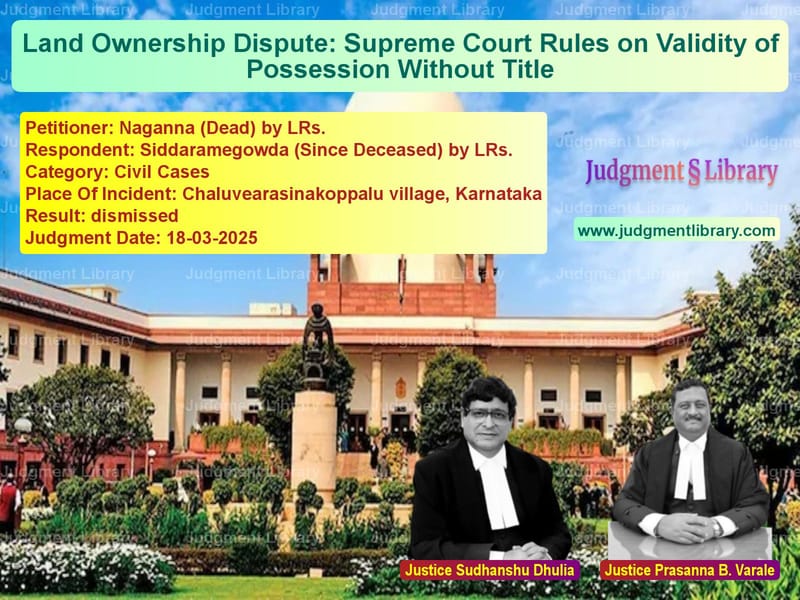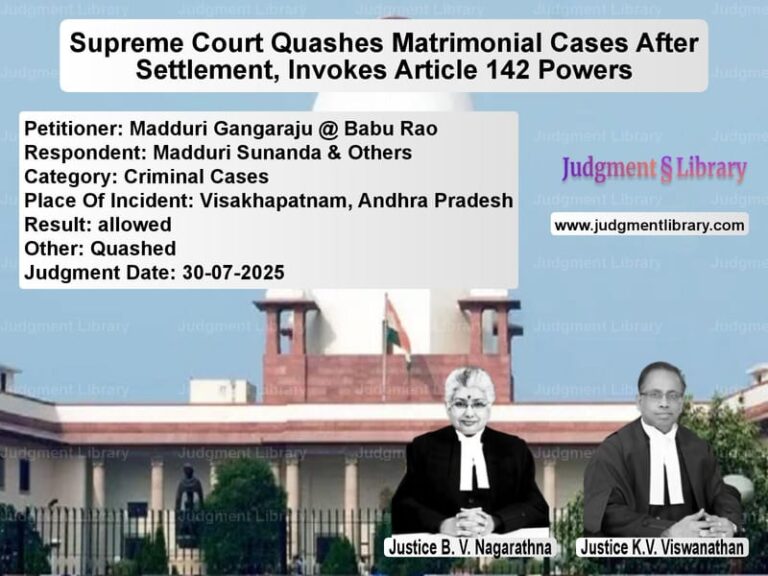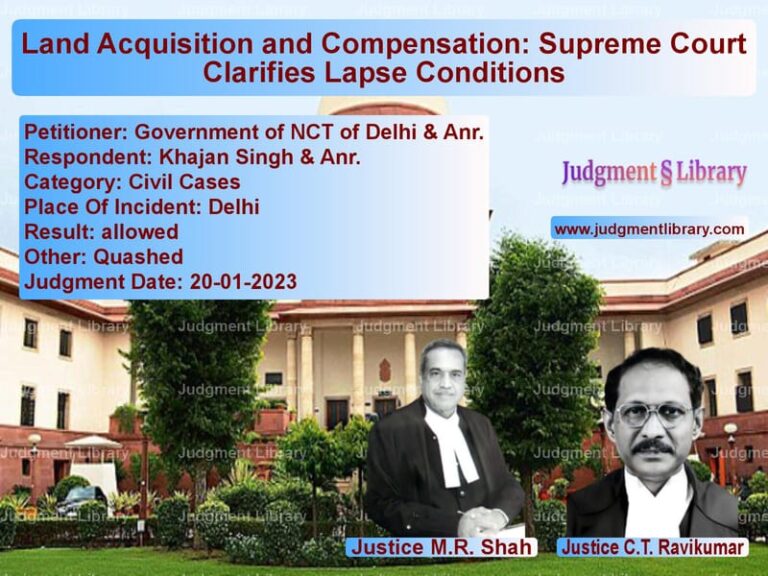Land Ownership Dispute: Supreme Court Rules on Validity of Possession Without Title
In a long-standing property dispute, the Supreme Court of India ruled in favor of the defendants in the case of Naganna (Dead) by LRs. & Others vs. Siddaramegowda (Since Deceased) by LRs. & Others. The Court upheld the Karnataka High Court’s decision, reinforcing the principle that mere possession of land does not establish ownership unless supported by valid legal title. The ruling emphasizes the importance of title documents in property disputes and highlights the limitations of possession-based claims.
Background of the Case
The dispute dates back to the late 1980s, involving agricultural land located in Chaluvearasinakoppalu village, Pandavapura taluk, Karnataka. The primary conflict arose between the plaintiff, Siddaramegowda, and the defendants, heirs of Naganna, over ownership rights. The land was originally owned by Kalegowda, the father of the defendants.
The plaintiff claimed that his father, Siddegowda, had been allotted the land in an oral partition within the family and had been cultivating it for years. However, the defendants argued that the property was lawfully registered in their name following a sale transaction with the rightful owner, Kalegowda. This led to multiple legal battles.
Chronology of Legal Proceedings
- In 1987, the plaintiff filed a suit seeking a declaration of ownership and permanent injunction against the defendants, preventing them from interfering with his possession.
- The Trial Court ruled in favor of the plaintiff, recognizing his long-term possession as evidence of ownership.
- The defendants challenged the ruling in the First Appellate Court, which reversed the Trial Court’s judgment, emphasizing that ownership must be based on legally recognized title.
- The plaintiff then approached the Karnataka High Court, which upheld the First Appellate Court’s findings.
- Finally, the case reached the Supreme Court of India, where the plaintiff sought to overturn the High Court’s ruling.
Petitioner’s Arguments (Naganna’s Heirs)
- The plaintiff had been in possession of the land for over four decades, proving continuous and uninterrupted ownership.
- The sale deed executed in favor of the defendants was fraudulent, as the original owner, Kalegowda, had allegedly transferred the land to the plaintiff’s father before the sale.
- The revenue records reflected the plaintiff’s name, establishing his ownership rights.
- The High Court exceeded its jurisdiction under Section 100 of the Civil Procedure Code by interfering with the Trial Court’s factual findings.
Respondents’ Arguments (Siddaramegowda’s Heirs)
- The plaintiff failed to provide any valid sale deed, partition deed, or any other legal document proving ownership.
- Revenue records alone do not confer ownership; title must be established through a registered deed.
- The sale deed in favor of the defendants was legally executed, and possession by the plaintiff was unauthorized.
- The Trial Court erred in granting ownership rights based solely on possession.
Key Observations by the Supreme Court
The Supreme Court examined whether possession alone could establish ownership in the absence of a valid title. The Court ruled:
“Ownership in immovable property is not established by mere possession. It must be backed by valid legal documents proving title.”
“The doctrine of adverse possession does not apply unless the party asserting possession can prove hostile, continuous, and exclusive possession for the statutory period.”
The Court emphasized that possession, even if long-term, cannot supersede registered ownership rights.
Most Important Verbatim Arguments from the Judgment
“A plaintiff who seeks declaration of ownership must establish the same by producing cogent evidence, which includes title documents and legal instruments.”
“Revenue records, while important for taxation purposes, do not create or extinguish ownership rights.”
“The mere fact that a person has been in possession of the property for a long time does not automatically grant them ownership unless it is supported by legal evidence.”
The Court rejected the argument that long-term possession, even if uninterrupted, could confer ownership in the absence of a valid title document.
Final Judgment and Conclusion
- The Supreme Court dismissed the appeal, upholding the Karnataka High Court’s ruling.
- The plaintiff’s failure to provide valid title documents proved detrimental to the case.
- The registered sale deed in favor of the defendants was deemed legally valid.
- The Court reaffirmed that possession alone is insufficient to claim ownership without a valid title.
This judgment reinforces the legal principle that ownership disputes must be determined based on documentary evidence rather than possession claims. It also serves as a cautionary ruling for those attempting to assert ownership over properties without registered title documents.
Petitioner Name: Naganna (Dead) by LRs..Respondent Name: Siddaramegowda (Since Deceased) by LRs..Judgment By: Justice Sudhanshu Dhulia, Justice Prasanna B. Varale.Place Of Incident: Chaluvearasinakoppalu village, Karnataka.Judgment Date: 18-03-2025.
Don’t miss out on the full details! Download the complete judgment in PDF format below and gain valuable insights instantly!
Download Judgment: naganna-(dead)-by-lr-vs-siddaramegowda-(sinc-supreme-court-of-india-judgment-dated-18-03-2025.pdf
Directly Download Judgment: Directly download this Judgment
See all petitions in Property Disputes
See all petitions in Landlord-Tenant Disputes
See all petitions in Specific Performance
See all petitions in Judgment by Sudhanshu Dhulia
See all petitions in Judgment by Prasanna Bhalachandra Varale
See all petitions in dismissed
See all petitions in supreme court of India judgments March 2025
See all petitions in 2025 judgments
See all posts in Civil Cases Category
See all allowed petitions in Civil Cases Category
See all Dismissed petitions in Civil Cases Category
See all partially allowed petitions in Civil Cases Category







